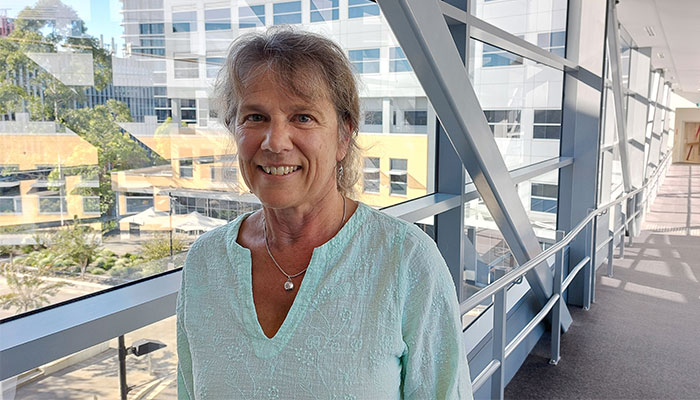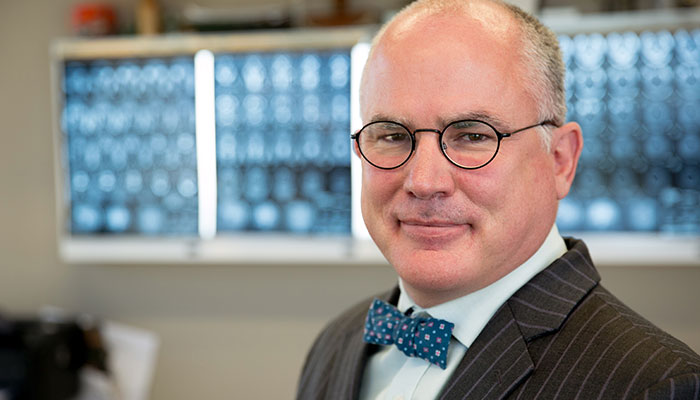When Lyndall Zinga first felt weakness in her thumb and twinges in her neck, she hoped she had a pinched nerve, but she had a sinking feeling it was something far worse.

Success story: Lyndall Zinger is one of four people at Macquarie University to have received the new drug for familial MND. Image: Georgia Gowing.
Both her mother and grandfather had died from the neurodegenerative disorder motor neuron disease (MND), and six months after she first noticed a problem, she too received the diagnosis she had dreaded.
"It moves so quickly," Mrs Zinga, 59, says.
"My mother barely had 12 months from the time she was diagnosed to being gone, so I just thought, 'Well, that's it.'
"I could feel it creeping up my right arm, and within a year of that first twinge, I'd completely lost use of it."
Soon after, in November 2021, Mrs Zinga received her first monthly infusion of tofersen, the ground-breaking new drug designed to treat inherited MND caused by an error on the SOD1 gene.
She is one of four people at Macquarie University Hospital and just 10 Australia-wide to have received the drug to fight the symptoms of familial MND, and the effect has been remarkable.
"It has slowed the progression from a waterfall to a trickle," she says.
"I noticed straight away that some of the aches had gone, and I wasn't feeling as tired. I just wish it had been available when I was first diagnosed, because it might have saved my arm.
"This gives you hope for the future – a chance to keep on living. I have two daughters, and it gives me hope for them, too."
The genetic link
About 2500 Australians are currently living with MND, and another 800 are diagnosed each year.
Also known as amyotrophic lateral sclerosis (ALS), MND causes the progressive loss of the neurons that allow the brain and spine to communicate with the muscles.
Patients in the early stages of the disease begin by experiencing muscle weakness, but as it progresses, they gradually lose the ability to walk, speak, swallow and breathe unaided.
Until now, it has been untreatable, and most patients die within two to five years of diagnosis.
MND is either inherited, like Mrs Zinga's, or sporadic.

Trail blazer: Professor Dominic Rowe says the effect of the drug tofersen is "nothing short of miraculous" and will lead the way for treatment of other forms of MND.
Only about 10 per cent of MND is inherited, but to complicate matters, the same genetic anomaly is not responsible in every case.
In 1993, SOD1 was the first gene to be identified as causing MND, but more than 40 other genes have since been linked to the disease.
Tofersen, which was developed by international biotech company Biogen in collaboration with Ionis Pharmaceuticals, recently received approval from the US Food and Drug Administration to treat the symptoms of SOD1 MND.
In Australia, it has been available to patients under the Extended Access Scheme for 18 months.
But tofersen's developers also hope that it could prevent the symptoms of SOD1 MND from developing at all if administered early enough, and this is being tested through an international clinical trial.
Stopping MND before it starts
Previous research discovered that when neurons are damaged, a protein known as neurofilament light chains (NfL), begins to leak from them and appear in the blood and other bodily fluids.
This early warning sign can be identified through blood tests well before the symptoms of neurological damage begin to take hold.
The ATLAS Preventative Trial uses this marker to identify the best time for patients with the faulty SOD1 gene to begin receiving tofersen infusions.
Multiple other gene therapies will become available to patients after this.
Macquarie University Hospital is the only site in the Southern Hemisphere to be taking part, and so far, seven pre-symptomatic patients have enrolled in the study.
Professor Dominic Rowe is the Foundation Professor of Neurology at Macquarie University, and a Director of the Macquarie University Centre for Motor Neuron Disease Research. He has been treating people with MND for more than 20 years, and is leading the Australian arm of the ATLAS trial.
"The fact that there is now a treatment for even one form of MND is nothing short of miraculous, and it gives us hope for further treatments for other types of MND," Professor Rowe says.
"It represents 30 years of research effort since the SOD1 gene was first implicated in familial MND.
"With only 10 per cent of MND cases being inherited, and 43 different genes responsible for those cases, the number of Australian MND patients with errors on the SOD1 is relatively small.
"The premise of using gene therapies to reduce the gene expression for one gene error will be replicated for other types of MND, and it represents a dramatic intervention for patients.
"Multiple other gene therapies will become available to patients after this."
There is already a study underway for another gene therapy to target MND caused by errors on the c9orf72 gene.
The Macquarie University Centre for MND Research currently has five clinical trials underway, including the world-first trial of the drug 3K3A-APC, which received $1 million in funding from the NSW charity Firies Climb for MND.
Developed by ZZ Biotech, 3K3A-APC targets sporadic MND and is designed to repair damage to the blood-brain barrier caused by the disease.
Professor Rowe says 3K3A-APC has now passed its first, acute dosing phase, which tests for how safe and well tolerated a drug is.
Later this year, it will enter its second phase, which tests the effect of lower doses over a longer period of time.
Dominic Rowe is the Foundation Professor of Neurology at Macquarie University and a Director of the Macquarie University Centre for Motor Neuron Disease Research.
The Macquarie University Centre for Motor Neuron Disease Research is holding its annual gala dinner on Friday, 23 June 2023 to raise funds to further its MND research.






